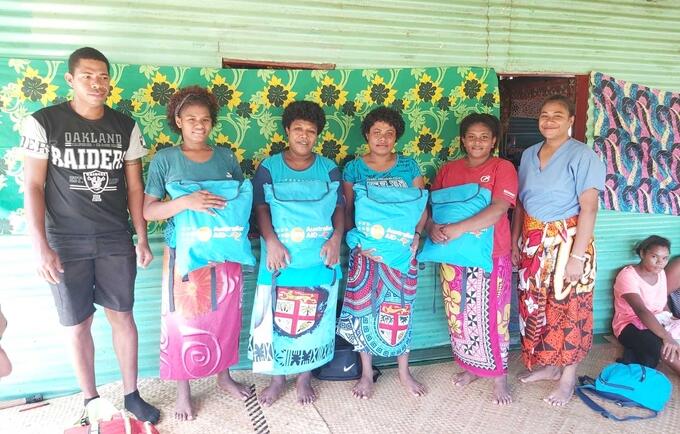On 17 December 2020, severe TC Yasa (Category 5 intensity) made landfall on Bua district of Vanua Levu (part of the Northern division) – Fiji’s second-largest island.
In the aftermath of natural disasters, women and girls are exposed to a range of risks to their health and well-being which demand urgent and critical action. UNFPA supports governments and national partners to ensure that the reproductive health needs and protection concerns of women and girls are met during disasters. One such way is by providing dignity kits. Under the DFAT-supported Regional Prepositioning Initiative Phase II, UNFPA Pacific donated 1,200 dignity kits and 100 dignity kits for women with disabilities in response to TC Yasa.
In partnership with the Fijian Government, stakeholders, and civil society organizations, and with the support from the Government of Australia, the UNFPA Pacific humanitarian team was deployed to the most affected areas by TC Yasa within 48 hours. The UNFPA Pacific response, first and foremost, focused on ensuring and maintaining the dignity of women and girls. This required the distribution of dignity kits, including customised kits for women with disabilities, providing women and girls with clothes and sanitary pads among other items. These kits ensure that women and girls can access basic services, including health care during these critical weeks. UNFPA also works through these distributions to ensure women and girls and young people have access to information of where to access ongoing needs for sexual and reproductive health services and responses for gender-based violence. The UNFPA Pacific Dignity Kits with sarongs, reusable sanitary napkins, soap and combs, sandals, towels, t-shirts, underwear, soap case, flashlights, mosquito coils, zip lock bags, toothbrush and toothpaste, whistle, and disposable sanitary napkins in their blue waterproof bag, are the only possessions that were left for these women.
UNFPA Pacific team on the ground met with Mele (name has been changed to protect the privacy of person) an 18-year-old mother of a 10-month girl child of Keka Village, who through UNFPA’s community outreach was introduced to long-acting contraceptives. Mele could only attend primary school. She was unaware of the family planning method till she got pregnant. During TC Yasa outreach, nurses counseled her and she immediately understood the benefits of family planning and accepted to be on the family planning method. She received her first Depo shot (birth control injection) on the day of the outreach. A follow-up date was given to her and she will continue to get her consecutive shots at the Nakorowatu Health Centre. “I never knew about any family planning method until I got pregnant. I am happy to receive the Depo injection. I am now protected from unintended pregnancy,” said Mele.
UNFPA Pacific team had a talanoa session with women and girls in the Keka community, about their sexual and reproductive health needs and how to build back better. Access to services is critical and adolescent pregnancy, like Mele, is common in the area.
UNFPA Pacific is now preparing to procure and distribute menstrual kits to the women and girls affected by the cyclone in the North.




